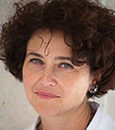
Prof. Edith Heard
Monday, 18 December 2017 at 18:00
Print Media Academy, Kurfürsten-Anlage 52-60, Heidelberg
Kindly supported by Manfred Lautenschläger Stiftung
Edith Heard, Professor at Collège de France and Institut Curie, Paris, and EMBL’s Director General Elect
Dynamic Genome and Epigenomes: How mosaic are we?
Abstract
Understanding how the information encoded by the genome contributes to phenotypic variation remains one of the great challenges in life sciences. It is now accepted that the cells of an organism all contain essentially the same DNA and that differential gene expression accounts for different cell identities. However, even within an individual, there can be remarkable phenotypic variation between cells of the same type. What accounts for differences within an individual, even in genetically identical cells, or for differences between genetically identical individuals such as twins? What are the driving forces for such phenotypic variation? Epigenetic changes account for some of this variation. A striking example of this is the mammalian process of X-chromosome inactivation in females, whereby one of the two X chromosomes is silenced at random early on in development and then maintained in a clonally heritable manner, leading to cellular mosaicism for X-linked gene expression and phenotypic variability. Variation in the degree of silencing of some X-linked genes provides an added level of phenotypic diversity in females and may account for sex-biases in metabolic, immune and neurological diseases. Recently, some autosomal genes have also been found to become epigenetically silenced on one of the two chromosomes – with implications for phenotypic diversity and disease predisposition between individuals. This lecture will present an overview of the ways in which epigenetic variation can contribute to phenotypic variation in development and disease. Furthermore, evidence that DNA sequence variation within individuals can sometimes underlie phenotypic variation will be discussed. Drivers of such variation are Transposable elements (TEs), which are DNA segments that can move around the genome. They are usually epigenetically repressed in somatic cells but can become re-expressed and remobilized in some somatic tissues and particularly in tumors, leading to both genetic and epigenetic cellular mosaicism. TEs are probably the most powerful genetic force engaged in the evolution of higher species. They sprinkle genomes with thousands of identical sequences, paving the way for recombination events that can trigger deletions or duplications. They exert a wide range of transcriptional influence, either directly or via host mechanisms responsible for their control.
Biography
Edith Heard is a British scientist working at the Institut Curie in Paris and Professor of Epigenetics and Cellular Memory at the Collège de France. She graduated from Cambridge University in 1986, specializing in genetics, and then carried out her PhD at the Imperial Cancer Research Fund in London, working on gene amplification mechanisms in cancer. She moved to the Pasteur Institute in Paris in 1990, as a post doc and then as a CNRS scientist, which is where she began her studies on the epigenetic process of X-chromosome inactivation. After a year at Cold Spring Harbor she established her lab at the Curie Institute in 2001. She is currently director of the Genetics and Developmental Biology Department at the Institut Curie. Her laboratory focuses on epigenetic processes in mammals, with a particular interest in epigenetics and the role of non-coding RNAs, chromatin structure and nuclear organization, in the establishment and maintenance of differential expression patterns during development and in disease. She became an EMBO member in 2005, Professor of Collège de France in 2012 and was elected as a Fellow of the Royal Society in 2013. She has won several prizes, most recently in 2017 she was awarded the Grand Prix of INSERM and the European Society of Human Genetics award. In June 2017, EMBL Council selected Edith Heard unanimously as EMBL’s fifth Director General. Her mandate is scheduled to begin 1 January 2019, she will succeed Iain Mattaj.
For more information: https://news.embl.de/lab-matters/embl-next-director-general/